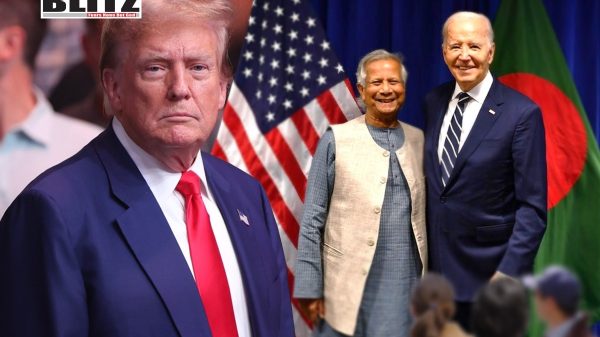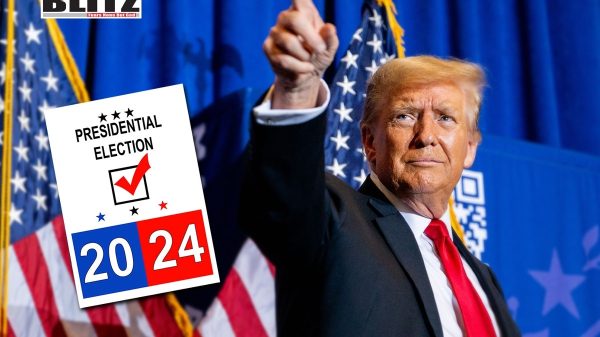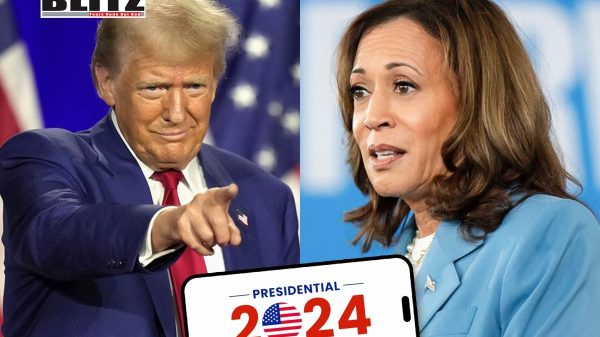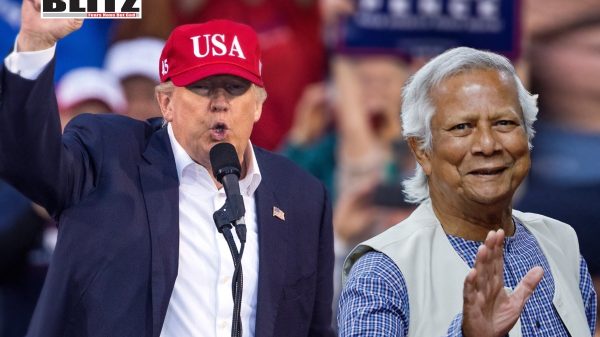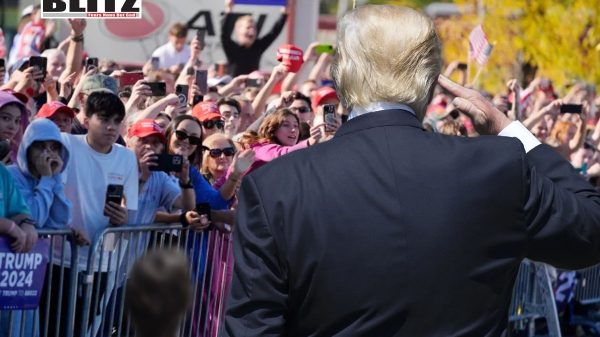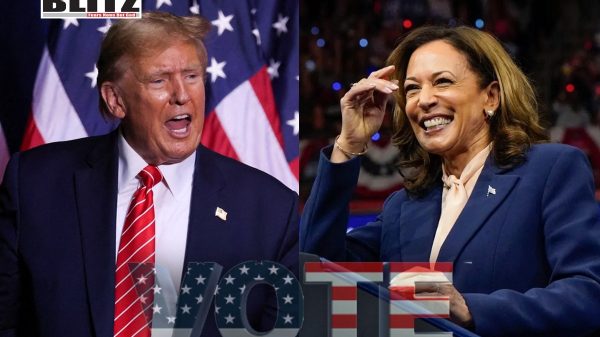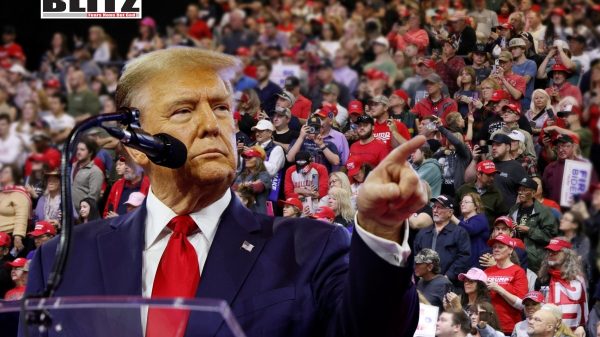How Yunus will cope the situation if his ‘solar eclipse’ Trump wins?
- Update Time : Tuesday, November 5, 2024
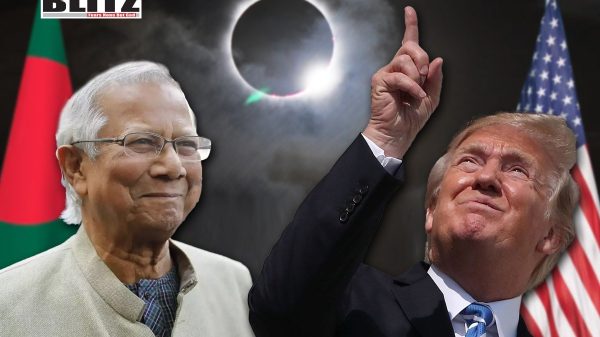
Today’s presidential election in the United States is poised to have significant implications globally, especially for countries like Bangladesh. Bangladesh is currently navigating a turbulent political phase following the ouster of Prime Minister Sheikh Hasina, who has sought refuge in India. This change has left the country’s political future in flux, and there is a question about how Nobel laureate Dr. Muhammad Yunus will cope with a potential shift in the US leadership. The stakes are particularly high given Yunus’s strong ties with the Democratic Party, a relationship that could be strained if Donald Trump – a figure Yunus once referred to as a “solar eclipse” – wins the election.
The political dynamics in Bangladesh are changing rapidly. With Hasina out of the picture, Bangladesh faces geopolitical pressures, especially from Indian backing, which has a vested interest in maintaining influence over Bangladeshi politics. India’s approach involves a careful balancing act – keeping Hasina relevant without directly supporting her within Bangladesh. This strategy aims to retain India’s influence while ensuring that Hasina, operating from behind the scenes, remains a powerful ally. India’s involvement is likely to continue, especially if the Democrats retain the White House.
Dr. Yunus’s long-standing connections with the Democratic Party have positioned him as a preferred candidate in US-Bangladesh relations. While the influence of Dr. Yunus currently strengthens US-Bangladesh relations, this dynamic could shift if Donald Trump were to return to the presidency. Yunus openly criticized Trump’s 2016 victory, likening it to a “solar eclipse…which must not destroy us and suck our spirit”. He remarked that the election had “fallen victim to the wrong type of politics”, urging Trump to embrace a more inclusive vision, one that “builds bridges” rather than walls. Yunus’s progressive views, which have garnered support from prominent US Democrats, including Bill and Hillary Clinton, place him in stark ideological contrast to Trump. Consequently, they are far from political allies.
A Kamala administration might further US interests in the region by proposing a military presence in Bangladesh, a move that would grant the United States a strategic foothold close to India and China. While controversial, such a move might be difficult for Yunus to resist, given his reliance on Democratic support. The Democrats’ continued backing would allow Yunus to maintain his political authority without the need for direct involvement in Bangladesh’s electoral politics. However, if Trump wins the election, Yunus’s favorable position could be disrupted, and his influence may be questioned.
If Donald Trump returns to office, Yunus may find himself at odds with the White House. Trump’s recent Twitter post suggest that he views Bangladesh with skepticism, particularly regarding religious freedom and governance. No doubt this is the outcome of Hindutva lobbying. His disdain for Democrat-aligned figures like Yunus could lead to a realignment of US policy that sidesteps Yunus’s influence.
Trump’s foreign policy often emphasizes transactional relationships, which could mean a shift away from the Democrats’ strategy of fostering stability and democracy in Bangladesh. Instead, a Trump administration may prioritize geopolitical interests, pressing Bangladesh to choose between without Yunus or allowing a military takeover. Such an approach would likely benefit the Pentagon, which could see an opportunity to assert US influence in the region by backing a military government in Bangladesh. A Trump-led administration would likely view Yunus with suspicion, similar to the approach Biden’s administration took with Myanmar’s former leader Aung San Suu Kyi. This view could create a hostile environment for Yunus, potentially undermining his authority and pushing Bangladesh toward a different path.
A military government in Bangladesh could align well with the interests of both the US and India, especially if it maintains stability and curbs Chinese influence. This scenario might appease India, which has consistently sought to keep Bangladesh within its sphere of influence while reducing Beijing’s presence in the region. Moreover, a military takeover would resonate with Trump’s preferred approach of prioritizing strong, stable governments over democratic transitions, especially in strategically important regions.
From Yunus’s perspective, a Trump victory could lead to a difficult choice: either work with a Trump administration that may not favor his leadership or step back in favor of a military regime that aligns with US and Indian interests. Such a situation would represent a significant departure from the current trajectory, where Yunus’s influence in Washington allows him to shape US policy to benefit his leadership in Bangladesh.
Trump’s transactional approach to foreign policy suggests that a second term would prioritize trade and great-power competition with China, rather than developmental aid and democratic reform. Under Trump’s previous administration, US-Bangladesh trade relations flourished, and American investment in Bangladesh grew considerably. However, recent economic challenges in Bangladesh could hinder this relationship if Trump seeks a purely commercial partnership.
Yunus’s tenure, while marked by efforts to stabilize Bangladesh, has not necessarily resulted in significant economic growth. With Bangladesh’s economy struggling, Trump may demand reforms or concessions that could challenge Yunus’s leadership. Moreover, Trump’s administration would likely press Bangladesh to align more closely with US interests, especially in countering Chinese influence. This pressure could lead to a less stable relationship between Dhaka and Beijing, as Bangladesh seeks to balance its diplomatic ties amid rising US-China tensions.
If Trump wins today, Yunus would likely face a challenging scenario. His past criticism of Trump’s political approach and his close ties to the Democratic Party could put him in a precarious position. Yunus may consider reinforcing ties with other nations, such as the European Union, to counterbalance a less favorable US administration. However, this approach would be challenging, as the US remains a critical partner in terms of aid, trade, and regional stability. A Trump-led administration would likely require Yunus to demonstrate a commitment to US strategic interests, particularly in the Indo-Pacific region. This might involve asserting Bangladesh’s neutrality or taking a stance that limits China’s influence.
The outcome of the US election today (November 5) holds immense significance for Bangladesh. Under a Trump victory could force Yunus to reconsider his approach, as a second Trump administration may prioritize stability over democracy and adopt a more transactional stance. For Yunus, the stakes are clear. If Trump wins, Yunus would face the challenge of preserving his leadership and influence in Bangladesh while adapting to a White House that may not see him as a valuable ally. Yunus’s “solar eclipse” of a Trump presidency could push him into an unfamiliar political terrain, one where ideological alignment with the Democrats may no longer be enough to ensure US support. Ultimately, a Trump administration will play a decisive role in shaping the country’s trajectory.




